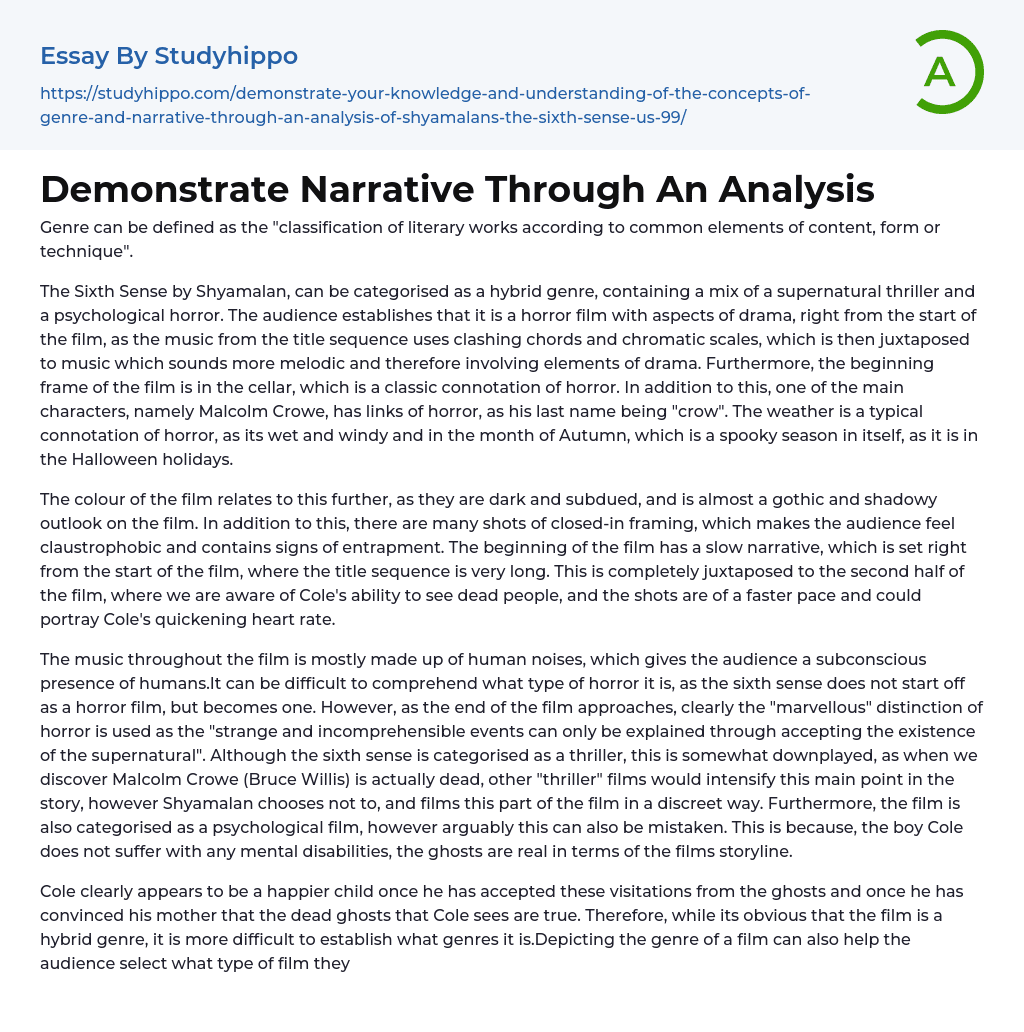Genre is the term commonly used to describe the categorization of literary works according to shared characteristics of content, form, or technique.
The movie The Sixth Sense directed by Shyamalan falls under the hybrid genre category, blending elements of supernatural thriller and psychological horror. From the start of the film, the audience can sense a horror vibe with some dramatic aspects in the music played during the title sequence featuring clashing chords and chromatic scales, followed by more melodic music. Additionally, the opening scene takes place in a cellar, which is a typical horror setting. Moreover, one of the main characters, Malcolm Crowe's surname is "Crow," generating horror links. Lastly, the weather in the autumn month, characterized by wind and rain, adds to the horror theme since it coincides with Halloween season.
The film's dark and subdued coloration p
...resents a gothic and shadowy perspective, with many shots featuring enclosed framing that creates a sense of claustrophobia and entrapment. The slow narrative at the beginning of the movie is set by a lengthy title sequence, which contrasts sharply with the fast-paced shots in the second half that reflect Cole's heightened awareness of his ability to see dead people and potentially his quickening heartbeat.
The majority of the film's music consists of human noises, creating an underlying awareness of human presence for the audience. It's difficult to determine the genre of horror at first, as The Sixth Sense begins as something else before becoming a horror film. Nonetheless, when the film nears its end, it unmistakably embraces horror by utilizing its "marvelous" distinction, presenting strange and incomprehensible happenings that can only be explained through supernatural acceptance. Though
classified as a thriller, The Sixth Sense tones down this element as it reveals Malcolm Crowe (Bruce Willis) is actually deceased. Comparable films would typically emphasize this reveal in a more thrilling manner; however, Shyamalan elects to handle it discreetly. Additionally, psychological film categorization is debatable since Cole, the boy character, doesn't possess mental disabilities - ghosts are real within the film's story.
Having accepted visits from ghosts and persuaded his mother about their existence, Cole becomes happier. Nonetheless, it is challenging to classify the movie into a distinct genre as it has hybrid features. Categorization aids viewers in selecting movies they want to see. Surprisingly, The Sixth Sense appeals equally to both males and females, with older women and younger boys forming the majority of its audience - an unusual trend for horror films.
The success of the film can be attributed to its ability to attract both male and female viewers, despite the presence of horror and ghosts. In addition to relatable conflicts and dilemmas that tend to appeal more towards women, smaller storylines are interwoven throughout the main plot. For instance, Lynn - Cole's mother - is torn between her love for her child and confusion over his behavior, adding an emotional and family-centric aspect to the movie that makes it a melodrama. Furthermore, using four narrators reinforces this genre choice since multiple narrators are typical in melodramas.
In addition, the sixth sense features two interconnected storylines, those of Cole and Malcolm, and incorporates an unexpected plot twist common in melodramas, exemplified by Malcolm's realization of his own death. However, despite several melodramatic elements, the film cannot be classified as such
because it doesn't revolve solely around a woman's perspective. The sixth sense also establishes its unique genre through Bruce Willis' performance, as he is often associated with action films. This divergence from his usual roles may have attracted his fan base to the film while potentially disappointing others.
The film's plot follows a chronological order, with the exception of a few flashbacks. The story is told by two main characters, driving the audience towards the end. However, one of the narrators, Malcolm, is unreliable due to his unawareness of his own death. This lack of information creates a significant impact on the shocking ending of Shyamalan's film. Furthermore, when Malcolm realizes his state, it becomes evident that his interactions with other characters were misleading and did not take place in reality.
The audience is led to reinterpret events due to a dramatic change, causing them to see Shyamalan's two narratives: one for first time viewers and another for second time viewers who know Malcolm is dead and look for clues. Continuity of revelations drives the narrative, keeping the audience captivated. Shyamalan uses continuity editing to weaken the narrative by omitting shots between characters. The plot, subplots, and relationships come to an end, providing closure as all questions are answered and a sense of finality is achieved.
- Sonnet essays
- Concert essays
- Piano essays
- Hip Hop essays
- Music Reference essays
- Musical Instruments essays
- Mp3 essays
- Recording essays
- Music video essays
- Singing essays
- Song essays
- Tupac shakur essays
- Classical Music essays
- Opera essays
- Rock Music essays
- Blues essays
- Jazz essays
- Sonata essays
- Baroque Music essays
- Rock And Roll essays
- Ludwig Van Beethoven essays
- Michael Jackson essays
- Popular music essays
- Band essays
- Classical Concert essays
- Music Concert Report essays
- Music Awards essays
- Walk This Way essays
- Song Analysis essays
- Actors essays
- Celebrity essays
- Magic essays
- Media essays
- Movies essays
- Music essays
- Roller coaster essays
- Television essays
- Video Game essays
- John Locke essays
- 9/11 essays
- A Good Teacher essays
- A Healthy Diet essays
- A Modest Proposal essays
- A&P essays
- Academic Achievement essays
- Achievement essays
- Achieving goals essays
- Admission essays
- Advantages And Disadvantages Of Internet essays
- Alcoholic drinks essays




